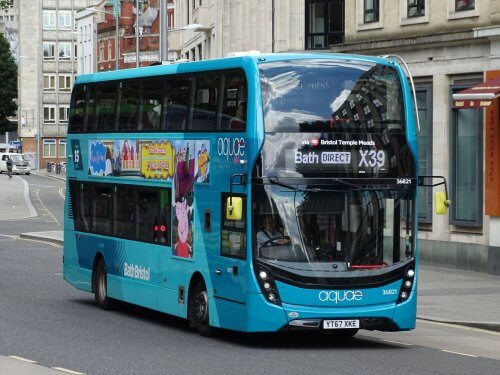
Bath’s Clean Air Zone comes into operation on 15 March – and First West of England is geared up and ready with a fleet of buses on the road already compliant with the new legislation.
The operator is aiming to have its entire fleet of buses in the city compliant at Euro VI standard, with a combination of new-build vehicles and retrofits of new technology to slightly older models.
Euro VI standard means harmful emissions are reduced by up to 95% compared to the oldest buses that have now been replaced. Work on the buses that serve Bath is part of a £30million investment programme across the whole of First West of England’s fleet to ensure that the company is at the forefront of cleaner, greener travel in the region.
This includes more than £3million worth of Euro VI buses introduced last spring in the new Aquae livery on the heavily-used Bristol to Bath route, services 39 and X39.
Bath’s Clean Air Zone is the first to be introduced outside of London. From 15 March, all non-compliant trucks, vans, coaches and buses (but not private cars and motorcycles) will be charged to drive in Bath’s City Centre.
First has been working closely with Bath and North East Somerset Council to ensure that it continues to provide customers with a reliable service throughout the city while complying with the new legislation.
This programme has been possible due to government funding and the technical support for the process has been provided by the Energy Saving Trust.
Across the UK, First Bus now has over 1,000 vehicles fitted with new exhaust systems and e-fans to comply with Euro VI emission requirements. It’s part of the company’s commitment to operating a zero-emission bus fleet by 2035, and a pledge not to purchase any new diesel buses after December 2022. Investing in retrofitting ensures the full lifecycle of each vehicle is fully utilised while reducing emissions, the company said, and helps support its longer term clean air ambitions.
Alongside scheduling challenges to meet the Covid-19 pandemic, First Bus said it has worked hard to ensure that operations have continued without interruption to customers during the retrofitting programme.
John Dowie, First Bus Strategy Director, said: “We are committed to doing everything we can to make our buses as environmentally friendly as they can be for the communities we serve. We estimate that each retrofit reduces air pollutants and harmful emissions by up to 95%, and this makes a considerable positive impact to air quality for our towns and cities. Bus services will be a fundamental part of economic recovery as the UK starts to emerge from the pandemic.”
Councillor Joanna Wright, Bath and North East Somerset Joint Cabinet Member for Transport Services, added: “We are pleased with the commitment First West of England has shown in ensuring it is complaint ahead of the 15 March. We can all do something to improve air quality in the city. While charges in the zone only apply to commercial and larger vehicles, we’re appealing to everyone to change their travel habits, particularly when Covid restrictions hopefully lift later in the year as people are vaccinated and the pressure on the NHS reduces.”

